By Camille Jackson
Staff Writer, Tolerance.org
It was here that a young Dr. Martin Luther King Jr. led a congregation and began his march toward fame. Here, he preached nonviolence in the face of Jim Crow. Rosa Parks sat down and refused to get up here, and thousands walked to work for more than a year because of her. The bus boycott started here. Thousands more walked here from Selma, seeking the right to vote.
But while Montgomery, Ala., has cradled many milestone events of the historic Civil Rights Movement, shame, guilt and divisions linger, perhaps keeping the city from fully claiming its past.
How well does the city of Montgomery acknowledge or recognize its civil rights history? As the Southern Poverty Law Center prepares to celebrate the opening of its new Civil Rights Memorial Center, answers to that question vary, depending upon whom one asks.
“I don’t think we do enough,” says Melma Gillis of the Dexter Avenue King Memorial Foundation, who recently retired to Montgomery. Gillis provides tours of Martin Luther King Jr.’s historic parsonage, where King lived when he served as minister of the Dexter Avenue King Memorial Baptist Church.
The Rev. Michael Thurman leads that congregation now. He says Montgomery is doing a better job of remembering the past, beginning to embrace its civil rights history, but still has some distance to go.
“Initially the white community was embarrassed by the circumstances that brought about [the movement],” Thurman says. “Fifty years is not a long time. History appreciates. I think people are still processing, digesting what happened. We’re even learning how to market it and package it in such a way to educate people so it won’t happen again.”
Historian Gwendolyn Patton of Trenholm State College agrees.
“I think they’re trying their very level best to do the right thing,” Patton says, noting how often reporters, researchers and the mayor’s office consult with her and other historians about Montgomery’s past.
Edwin Bridges describes it differently. Director of Alabama’s Department of Archives, Bridges says Montgomerians still haven’t come to terms with the city’s history and are slow to change due to a combination of guilt, shame and embarrassment.
“White folks, including myself, who were pro-segregation haven’t recognized the degree to which the Civil Rights Movement liberated white people, too,” Bridges says. “They were living in a world of self-deception.”
The anniversary
Dec. 5, 2005, will mark the 50th anniversary of Montgomery’s bus boycott, where blacks refused to ride segregated city buses for one year and 16 days. The long-running boycott was sparked by Rosa Parks’ refusal to give up her seat to a white man.
While many groups are making anniversary plans, some criticize the city for a disjointed effort.
“They’re just exploiting the 50th to raise money,” says state Rep. Alvin Holmes, D-Montgomery, of the city’s efforts. “The city government wants to recognize the Confederacy, the history of the Confederacy that served to oppress black people. I don’t think they do anything as it relates to the Civil Rights Movement. However, people in the city are very committed.”
Holmes says the Montgomery Improvement Association, which was founded to coordinate the boycott in 1955, was left out the city’s plans — a move Holmes calls an insult.
Rickie Brunner of Alabama’s Department of Archives also speaks of such exclusion.
“I think it’s very unfortunate,” Brunner says. “Some people are very unhappy about the plans because they believe they have not been included. I don’t know if it’s intentional.”
Brunner says the tension within the city isn’t just between black and white people. Within the white community, Brunner says, rifts exist between old Montgomery and new Montgomery.
And between faith communities. ‘ONE’ Movement?
The ONE Movement — a campaign of Christians led by Fresh Anointing, a black church, and First Baptist, a mostly white, once segregated church — aims to reconcile the community’s racial divisions. To celebrate the anniversary, ONE Movement leaders have proposed city residents place black and white crosses (PDF) on their front lawns.
(The ONE Movement should not be confused with One Montgomery, a long-standing community group that meets weekly to overcome racial, political and other differences.)
The two churches spearheading the ONE Movement describe the campaign as “a visible plan of Christian witness and racial reconciliation.” In a handout about the event, the churches describe the crosses as “God’s hammer for destroying barriers.”
Others, though, say the crosses are creating, not destroying barriers.
Some seem them as insensitive; a cross on the front lawn is a reminder of the burning crosses of KKK-style white supremacy. Others say the crosses exclude people of Jewish, Muslim and other faiths.
The Rev. Elizabeth O’Neill of Immanuel Presbyterian Church told FOX News the cross is not an appropriate symbol for such a campaign.
“It feels much more to me like an evangelistic crusade than a community celebration,” she said.
“You can’t have a celebration of the civil rights movement and leave [the Jewish community] out,” Holmes says. “This group [the ONE Movement] is just a phony, good-sounding name. There ain’t never been no ‘one’ Montgomery. It’s a con game that they are trying to pull on the people.”
Montgomery attorney and grassroots organizer Wayne Sabel, who is organizing a children’s walk commemorating the 50th anniversary of the boycott, hesitates to criticize the city’s efforts but admits that there has been dissension around the anniversary plans.
“We got into it because we didn’t see anything happening,” Sabel says of his group’s December anniversary plans. “We felt like we jumped into a vacuum. This is one of the most important events in American history. People in Montgomery don’t appreciate the significance.
“This was one of the largest nonviolent protests in history,” Sabel adds. “We’re not only honoring civil rights and human harmony but also showing that regular people can make a big change.”



